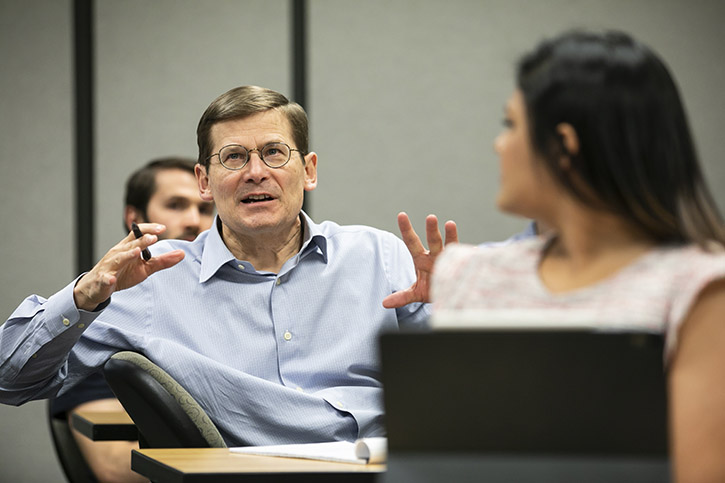
Students in Justin Gest’s Theory and Practice of Public Policy class had a unique opportunity this semester to receive feedback on their policy projects from former CIA deputy and acting director Michael Morell.
“Few people have received or delivered as many high-stakes briefings as Michael Morell,” said Gest, who is an assistant professor in the Schar School of Policy and Government. “It’s hard to think of anyone more qualified to advise students about the best way to present their ideas clearly and succinctly.”
Morell, who briefed four sitting U.S. presidents, from George H.W. Bush to Barack Obama, also oversaw a staff of intelligence professionals who communicated complex findings to policymakers and executives. He’s now a senior fellow at the Schar School’s Michael V. Hayden Center for Intelligence, Policy and International Security.
Gest’s students were tasked with presenting a set of policy memorandums on different topics they selected. Working in groups, they identified a policy problem, studied its consequences, evaluated possible alternatives and proposed solutions.
Four student groups presented on topics including social mobility and income inequality in Washington, D.C., mental health care in Virginia, the relationship of law enforcement to the mentally ill in San Francisco and employment patterns of women in Utah.
After the presentations, Morell shared advice with the class on how to strengthen their presentations and spoke about things to watch for in a real-life briefing session. Students felt his feedback was invaluable.
“Receiving feedback on how to brief, as well as how to craft policy, from someone who has done both for decades at the highest levels of U.S. government is exactly the sort of edge that the Schar School can offer,” said Joe Palank, a first-year master’s in public policy student. “[Morell] offered incredibly insightful and useful feedback on our local policy problem, which is a testament both to his own personal intelligence and the universal applicability of the public policy process.”
Even though Morell worked in a top-secret agency, he openly offered students as much insight as possible.
“It was a great experience because of all the advice [Morell] was willing to share,” said Charity Johnson, also a master’s in public policy student.
Some of that advice included to “never skip over unintended consequences” of a proposed policy option and “be ready for questions to fly at you, and don’t lie if you don’t know the answer,” Johnson said. “He gave us an idea of what it would feel like to be in our future careers, and that type of information is priceless.”
The experience was also a positive one for Morell, who has been a guest at several Schar School classes this semester.
“The most rewarding part was seeing how seriously the students had taken their research and their presentations and how open to learning they were,” Morell said.
He thought the presentations were excellent and was also impressed by how well the students gave and received constructive feedback to each another, he said.
“It is a testament to both the culture that [Gest] creates in the classroom, as well as the openness of the students to learning,” Morell said.
